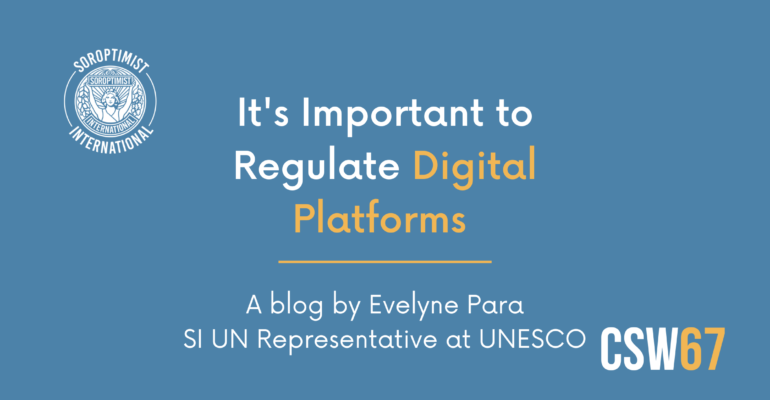Blog of Evelyne PARA, SI UN Representative at UNESCO
Faced with the amplification of disinformation that is flourishing on social networks, UNESCO organised a world conference in Paris entitled “Internet for Trust”.
It was a first of its kind, which brought together more than 4000 participants: governments, independent regulators, digital companies, universities and civil society! This event took place in February 2023 as an extension of the International Day of “Women and Girls in Science”.
It was also a way for UNESCO to prepare to join its voice to that of the entire United Nations family under the global theme “For an inclusive digital world: innovation and technologies for gender equality“, a theme that was associated with the one selected in March 2023 by the Commission on the Status of Women (CSW67).
Digital platforms have transformed our day-to-day lives…
Digital platforms, in their different modalities, are a fundamental part of our day-to-day lives. They define the way we are communicating, how we relate to other people and consume products and services. The development of the Internet has brought extraordinary accomplishments to the global economy and to our societies.
Digital platforms have helped to promote and disseminate knowledge and educational training – provided that the digital divide is reduced, because today three billion people in the world are still not connected to the Internet, mainly women and girls in developing countries.
They facilitate trade and empowerment. They increase productivity. They broaden the offer of services and the flow of information. It presents great opportunities, both economically and in challenging fields, such as our environmental issues and in health-care. The internet and social media have enabled people, both within local communities and across borders worldwide to connect in a way we have not seen before. This has often been a force for great positive change.
… But, at the same time, they have also introduced dangerous risks
Although they have revolutionised the means of communication and the sharing of knowledge driven by innovation and technological progress at an incredible, exponential speed, social media platforms are also partly responsible for the dissemination of disinformation, hate speech and conspiracy theories.
In this new media era and in this new form of modern agora represented by the Internet and social media, very often, instead of meeting, we lock ourselves up. We lock ourselves in “bubbles”, with people of the same opinion, where prejudices are no longer contradicted, but reinforced, where we no longer seek to convince, but to conquer, sometimes by propagating hatred of another, and for that too often privileging emotion over reflection.
Today, the internet and social media can be a dangerous place. Hate speech has driven people into despair and online harassment has ruined lives. We also know that vulnerable people have been radicalised through internet communities. It’s also notable how women, including politicians and public figures, are targeted with threats and sexual harassment. Here, the goal clearly seems to be to silence them and diminish their power. This is in line with tendencies seen before when traditional power structures change, and a wider group gets influence, the backlash against these changes becomes real. We must always fight against such tendencies, safeguarding the progress we have made towards a more equal and just world.
If these innovative technologies are to increase our common good, we need to ensure fair and equal accessibility. For example, to eliminate Artificial Intelligence (AI) algorithms that perpetuate and deepen existing gender discrimination and biases.
The technological revolution must remain a common good, accessible to all and inclusive
“The blurring of lines between right and wrong, the highly organised denial of scientific facts, the amplification of misinformation and conspiracies – all of this did not originate on social media. But, in the absence of regulation, they thrive there much better than the truth”, indicated Audrey Azoulay, UNESCO’s General Director, in her opening speech at UNESCO during this world conference in February 2023.
« Technology cannot be misused to suppress people, to surveil or harass women for example, or to shut down the internet », added Katrín Jakobsdóttir, Prime Minister of Iceland who also took part in this conference.
Therefore, it’s important to do everything to ensure that this technological revolution that we are all experiencing today remains a common good accessible to all and inclusive. UNESCO therefore invites all countries to reflect and act now, together, for writing the first global coordinated guidelines for the regulation of social media in order to improve the reliability of information, to promote human rights in line and ensure that no country or region is left behind.
Acting together, for global coordination
Many countries around the world have adopted, or are currently considering adopting, national legislation to combat the dissemination of harmful content. Some of these laws, however, give rise to fears of violations of the human rights of populations, in particular freedom of expression and opinion. There are also large disparities in terms of content moderation between different regions and languages. There is an urgent need for a globally consistent approach, based on international human rights standards.
We need to ensure that new technologies serve people, strengthen democratic processes and human rights, instead of undermining basic principles and values. Working groups will continue to reflect at UNESCO on the first proposals resulting from the meetings of February-March 2023, particularly in order to finalise the Guidelines for regulating digital platforms, a multistakeholder approach to safeguarding freedom of expression and access to information. The guidelines will be launched by UNESCO in September 2023.
Work that we will continue to follow at UNESCO, to make the global voice of Soroptimist International heard.

